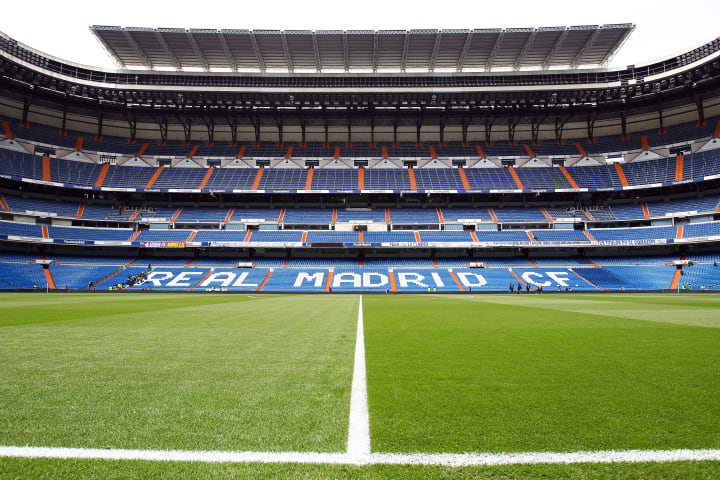FIFA’s desire to ensure the 100th anniversary of the FIFA World Cup is a special occasion has seen football’s supreme governing body announce that not one, not two, not three, not four, not five, but SIX countries will host matches at the 2030 World Cup.
Here’s everything you need to know about where the 2030 World Cup will be played and what stadiums could host the final.
- Which countries are hosting the 2030 World Cup?
Spain, Portugal and Morocco have been confirmed as the host nations for the 2030 World Cup, but they’re not the only countries that’ll be organising matches.
As this is the tournament’s 100th anniversary, Argentina, Paraguay and Uruguay have also been listed as commemorative hosts. Uruguay’s capital, Montevideo, will play host to what FIFA describe as a “unique centenary celebration ceremony” as the city hosted the first-ever World Cup match in 1930.
- Where will the first games of the 2030 World Cup be played?
The first three games of the tournament will take place in the aforementioned South American countries: Argentina, Paraguay and Uruguay.
FIFA president Gianni Infantino confirmed that as well as hosting a special ceremony, the first game of the 2030 World Cup will take place in Montevideo: “The first of these three matches will of course be played at the stadium where it all began, in Montevideo’s mythical Estadio Centenario, precisely to celebrate the centenary edition of the FIFA World Cup.”
Argentina have been chosen as a host because they were beaten by Uruguay in the 1930 World Cup final, while CONMEBOL’s headquarters are based in Luque, Paraguay. These three nations will automatically qualify for the 48-team tournament and each play on home soil before travelling to the Iberian Peninsula for the remainder of the tournament.
- What stadiums could host the 2030 World Cup final?
While South America will host the opening of the 2030 World Cup, the remainder will be held in Spain, Portugal and Morocco. The stadia used for the tournament are yet to be decided, but there are several options in regard to venues for the final. Here’s a list of possible options.
- Santiago Bernabéu, Madrid, Spain

It’s very early doors, but Real Madrid‘s iconic home ground is the early favourite to host the 2030 World Cup final.
The Santiago Bernabeu recently underwent a $550m renovation which took four years to complete. The stadium’s capacity has been boosted to over 85,000 and it now boasts a new wrap-around steel facade, a retractable roof and retractable pitch.
The Bernabeu hosted the 1982 World Cup final between Italy and West Germany. Should it play host to the final in 2030, it will become just the third stadium to host multiple World Cup finals.
- Grand Stade de Casablanca, Morocco

The stadium will be built ahead of the 2030 World Cup and will become Africa’s largest arena boasting a capacity of 113,000. The opening of such a grand venue in Morocco was previously proposed for the 2010 and 2026 World Cups, although their bids were unsuccessful in each case.
Their joint-hosting of the 2030 tournament gives Morocco the chance to finally go ahead with the stadium’s construction and it’s certainly a contender to host the final.
- Estádio do Dragão, Porto, Portugal

Nevertheless, Porto’s Estádio do Dragão is certainly a candidate. It’s not the biggest stadium Portugal has to offer, but it did host the 2021 Champions League final, albeit with a reduced capacity.
- Estádio da Luz, Lisbon, Portugal

The stadium is one of very few to host multiple Champions League finals (2014 and 2020) and also staged the final of Euro 2004 when Portugal were upset by Greece. This experience renders the Lisbon-based arena a strong candidate for hosting the 2030 World Cup final.
- Camp Nou, Barcelona, Spain

Barcelona have been able to finance the stadium’s much-needed renovation despite their infamous monetary problems and the project is set to be fully completed by 2026. Its capacity is set to rise to 105,000, but despite the improvements, the Spanish media have suggested it’s very unlikely for anywhere but the capital to host the final should it be held in Spain.
- 2030 World Cup potential venues
|
Stadium |
City |
Country |
Capacity |
|---|---|---|---|
|
Camp Nou |
Barcelona |
Spain |
115,000* |
|
RCDE Stadium |
Barcelona |
Spain |
40,000 |
|
Santiago Bernabeu |
Madrid |
Spain |
84,744 |
|
Wanda Metropolitano |
Madrid |
Spain |
70,460 |
|
Mestalla |
Valencia |
Spain |
70,000 |
|
San Mames |
Bilbao |
Spain |
53,289 |
|
Nueva Condomina |
Murcia |
Spain |
42,000* |
|
La Rosaleda |
Malaga |
Spain |
45,000* |
|
La Romareda |
Zaragoza |
Spain |
42,500* |
|
Balaidos |
Vigo |
Spain |
41,900 |
|
Riazor |
La Coruna |
Spain |
48,000 |
|
Estadio Gran Canaria |
Las Palmas |
Spain |
44,682 |
|
Anoeta Stadium |
San Sebastian |
Spain |
40,000 |
|
El Molinon |
Gijon |
Spain |
29,029 |
|
La Cartuja |
Seville |
Spain |
60,721 |
|
Estadio Jose Alvalade |
Lisbon |
Portugal |
50,095 |
|
Estadio da Luz |
Lisbon |
Portugal |
64,642 |
|
Estadio do Dragao |
Porto |
Portugal |
50,033 |
|
Grand Stade de Casablanca |
Casablanca |
Morocco |
93,000* |
|
Prince Moulay Abdellah Stadium |
Rabat |
Morocco |
69,500* |
|
Ibn Batouta Stadium |
Tangier |
Morocco |
88,000* |
|
Adrar Stadium |
Agadir |
Morocco |
45,480 |
|
Marrakesh Stadium |
Marrakech |
Morocco |
70,000* |
|
Fez Stadium |
Fes |
Morocco |
45,000 |
|
Antonio Vespucio Liberti |
Buenos Aires |
Argentina |
83,000 |
|
Estadio Conmebol |
Luque |
Paraguay |
83,000 |
|
Centenario |
Montevideo |
Uruguay |
60,000 |
*projected capacities for the 2030 World Cup
